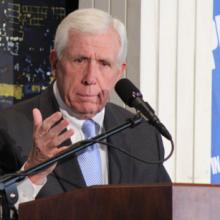Rep. Frank Wolf
Iraq’s Christians are begging the world for help. Is anybody listening?
Since capturing the country’s second largest city of Mosul in early June, the Islamic State, formerly known as ISIS, has ordered Christians to convert to Islam, pay taxes levied on non-Muslims, or die. The extremist Sunni group is also persecuting and murdering Turkmen and Shabaks, both Muslim religious minorities.
Human rights lawyer Nina Shea described the horror in Mosul to me: “[The Islamic State] took the Christians’ houses, took the cars they were driving to leave. They took all their money. One old woman had her life savings of $40,000, and she said, ‘Can I please have 100 dollars?’, and they said no. They took wedding rings off fingers, chopping off fingers if they couldn’t get the ring off.”
“We now have 5,000 destitute, homeless people with no future,” Shea said. “This is a crime against humanity.”
For the first time in 2,000 years, Mosul is devoid of Christians. “This is ancient Nineveh we are talking about,” Shea explained. “They took down all the crosses. They blew up the tomb of the prophet Jonah. An orthodox Cathedral has been turned into a mosque. … They are uprooting every vestige of Christianity.” University of Mosul professor Mahmoud Al ‘Asali, a Muslim, bravely spoke out against the Islamic State’s purging of Christians and was executed.
Rep. Frank Wolf, one of the loudest and most persistent voices in Congress for the right of people around the globe to practice their religions freely, will not seek an 18th term.
“As a follower of Jesus, I am called to work for justice and reconciliation, and to be an advocate for those who cannot speak for themselves,” Wolf, a Presbyterian, said in a statement Tuesday.
The Republican from Northern Virginia, who will turn 75 in January, said he will work on human rights, religious freedom, and other social issues in his retirement.

